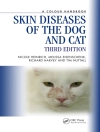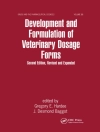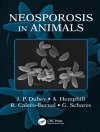Veterinary Pharmacology and Therapeutics, Ninth Edition is the long awaited update of the gold-standard reference on veterinary pharmacology and therapeutics. The field of veterinary pharmacology continues to evolve and expand and this new edition has been revised to reflect changes in the field. Veterinary Pharmacology and Therapeutics, Ninth Edition is thoroughly revised, updated, and expanded to meet the needs of today’s veterinarians, veterinary students, and animal health researchers.
Зміст
Section 1. Principles of Pharmacology.
1. Veterinary Pharmacology: An Introduction to the Discipline.
2. Absorption, Distribution, Metabolism, and Elimination.
3. Pharmacokinetics.
Section 2. Drugs Acting on the Autonomic and Somatic Nervous Systems.
4. Mechanisms of Drug Action and Pharmacokinetics/Pharmacodynamics Integration in Dosage Regimen Optimization for Veterinary Medicine.
5. Introduction to Neurohumoral Transmission and the Autonomic Nervous System.
6. Adrenergic Agonists and Antagonists.
7. Cholinergic Pharmacology: Autonomic Drugs.
Section 3. Anesthetics/Analgesics.
8. Introduction to Drugs Acting on the Central Nervous Systemand Principles of Anesthesiology.
9. Neuromuscular Blocking Agents.
10. Inhalation Anesthetics.
11. Injectable Anesthetic Agents.
12.Opioid Analgesic Drugs.
13. Sedative Agents: Tranquilizers, Alpha-2 Agonists, and Related Agents.
14. Local Anesthetics.
15. Euthanizing Agents.
Section 4. Autacoids and Anti-inflammatory Drugs.
16. Histamine, Serotonin, and their Antagonists.
17. Peptides: Angiotensin and Kinins.
18. Prostaglandins, Related Factors, and Cytokines.
19. Analgesic, Anti-inflmmatory, Antipyretic Drugs.
20. Anticonvulsant Drugs.
21. Drugs Affecting Animal Behavior.
Section 5. Drugs Acting on the Cardiovascular System.
22. Digitalis, Positive Inotropes, and Vasodilators.
23. Antiarrythmic Agents.
Section 6. Drugs Affecting Renal Function and Fluid-Electrolyte Balance.
24. Principles of Acid-Base Balance: Fluid and Electrolyte Therapy.
25. Diuretics.
Section 7. Drugs Acting on the Blood and Blood Elements.
26. Hemostatic and Anticoagulant Drugs.
Section 8. Endocrine Pharmacology.
27. Hypothalamic and Pituitary Hormones.
28. Hormones Affecting Reproduction.
29. Thyroid Hormones and Antithyroid Drugs.
30. Glucocorticoids, Mineralocorticoids, and Adrenolytic Drugs.
31. Drugs Influencing Glucose Metabolism.
Section 9. Chemotherapy of Microbial Diseases.
32. Antiseptics and Disinfectants.
33. Sulfonaminds and Potentiated Sulfonamides.
34. Beta-Lactam Antibiotics: Penicillins, Cephalosporins, and Related Drugs.
35. Tetracycline Antibiotics.
36. Aminoglycoside Antibiotics.
37. Chloramphenicol and Drivatives, Macrolides, Lincosamides, and Miscellaneous Antimicrobials.
38. Fluoroquinolone Antimicrobial Drugs.
39. Antifungal and Antiviral Drugs.
Section 10. Chemotherapy of Parasitic Diseases.
40. Antinematodal Drugs.
41. Anticestodal and Antitrematodal Drugs.
42. Macrocyclic Lactones: Endectocide Compounds.
43. Antiprotozoan Drugs.
44. Ectoparasiticides.
Section 11. Specialty Areas of Pharmacology.
45. Chemotherapy of Neoplastic Diseases.
46. Immunosuppressive Drugs and Cyclosporine.
47. Drugs Affecting Gastrointestinal Function.
48. Dermatopharmacology: Drugs Acting Locally on the Skin.
49. Drugs that Affect the Respiratory System.
50. Pharmacogenomics.
51. Therapeutic Drug Monitoring.
52. Considerations for Treating Minor Food-Producing Animalswith Veterinary Pharmaceuticals.
53. Zoological Pharmacology.
Section 12. Regulatory Considerations.
54. Legal Control of Veterinary Drugs.
55. Drug Approval Process.
56. Veterinary Pharmacy.
57. Regulation of Drug and Medication Use in Performance Animals.
58. Adverse Drug Reactions.
59. Dosage Forms and Veterinary Feed Directives.
60. USP’s Role in Veterinary Pharmacology and Evidence Based Information.
61. Chemical Residues in Tissues of Food Animals.
Index
Про автора
Jim E. Riviere, DVM, Ph D, DSc (hon), ATS, is Distinguished Professor and Director for the Center for Chemical Toxicology Research and Pharmacokinetics with the Department of Population Health and Pathobiology, College of Veterinary Medicine at North Carolina State University. He is also Editor for the Journal of Veterinary Pharmacology and Therapeutics.
Mark G. Papich, DVM, MS, Diplomate ACVCP, is Professor of Clinical Pharmacology, Department of Molecular Biomedical Sciences, College of Veterinary Medicine at North Carolina State University.












